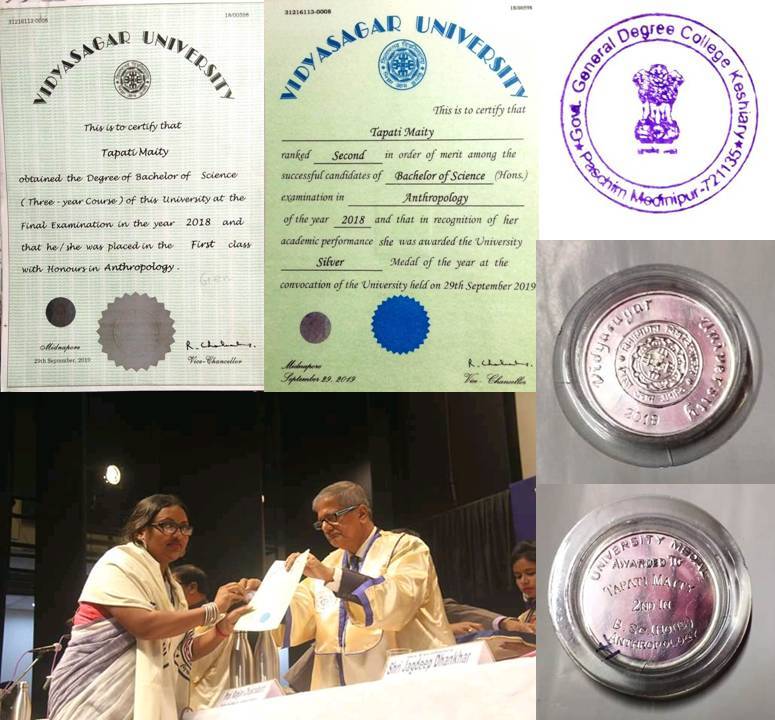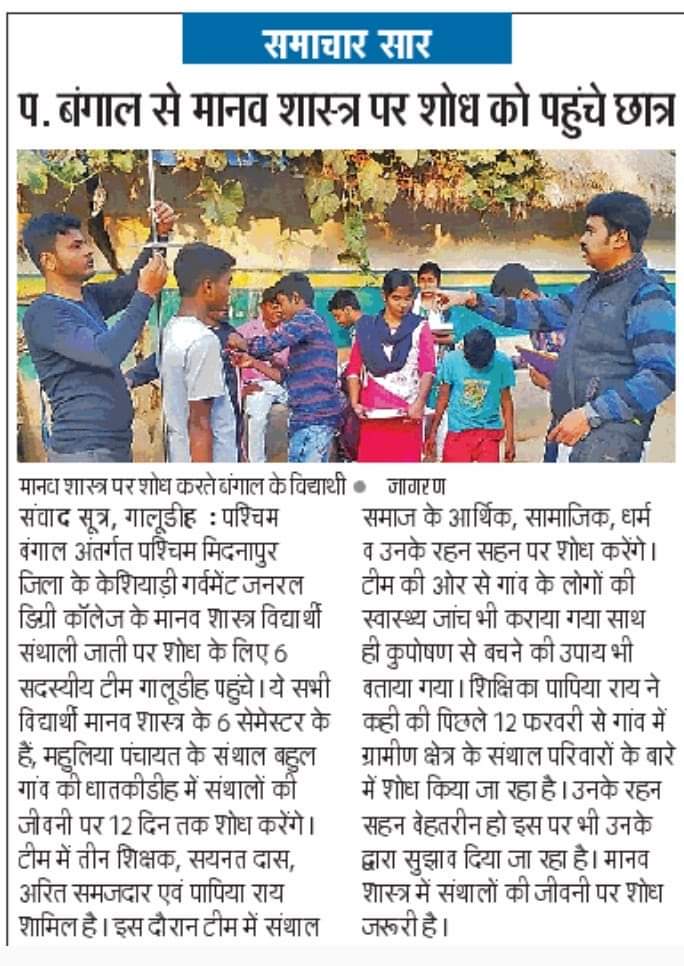
Government General Degree College, Keshiary
Government of West Bengal, Affiliated to the Vidyasagar University
Telipukur, Tilaboni Mahishamura, Keshiary, Paschim Medinipur, PIN : 721135.
NAAC accredited B+ (2.61) college
Department of Anthropology
Introduction
Anthropology is the systematic study of humanity, with the goal of understanding our evolutionary origins, our distinctiveness as a species, and the great diversity in our forms of social existence across the world and through time. The focus of Anthropology is on understanding both our shared humanity and diversity, and engaging with diverse ways of being in the world.
Anthropology is the study of people throughout the world, their evolutionary history, how they behave, adapt to different environments, communicate and socialize with one another. The study of anthropology is concerned both with the biological features that make us human (such as physiology, genetic makeup, nutritional history and evolution) and with social aspects (such as language, culture, politics, family and religion). Whether studying a religious community, or human evolutionary fossils, anthropologists are concerned with many aspects of people’s lives: the everyday practices as well as the more dramatic rituals, ceremonies and processes which define us as human beings. A few common questions posed by anthropology are: how are societies different and how are they the same? How has evolution shaped how we think? What is culture? Are there human universals? By taking the time to study peoples’ lives in detail, anthropologists explore what makes us uniquely human. In doing so, anthropologists aim to increase our understanding of ourselves and of each other.
While a few anthropology postgraduates go on to work as academic practitioner or researchers within academia, a significant number are increasingly finding employment in a variety of sectors, ranging from education, NGO and international development, to health-related professions. Often anthropologists do not follow linear career trajectories, but become involved in various projects in frequently overlapping career sectors.
Both at undergraduate and at postgraduate level, studying anthropology imparts a unique set of skills for working with people. Gaining a deep understanding of cultural and ethnic differences and learning how people’s perspectives, beliefs and practices fit into a wider social, political and economic context is crucial in today’s globalised world.
Anthropology as subject is not well known amongst the general population in India. As anthropology has now been taught at higher secondary school level, the Indian general public’s exposure to anthropology tends to be limited to museums, occasional newspaper articles, or TV programmes whose primary aim is entertainment. The result is that many misconceptions about anthropology persist. A common one is that anthropology is mainly about ‘bones and fossils’. These are indeed the special concern of biological and evolutionary anthropologists, who use the evidence of human remains and living sites to reconstruct the bodies, diets and environments of our prehuman ancestors. Social and cultural anthropology, however, is concerned with social relations in the ‘here and now’. A second misconception is that social anthropologists exclusively study ‘tribal’ peoples in ‘remote’ areas, whose cultural practices are perceived as ‘exotic’. While it is true that some anthropologists carry out their research in places far from metropolitan centres, there are many others who undertake research in their home towns, in urban settings or in the industrial workplace. A third misconception is that anthropology and archaeology are one and the same. Generally speaking, archaeology is about people and cultures in the near or distant past, and social anthropology is about present-day peoples and cultures.
Welcometo
About the Department
Department of Anthropology has been an integral part of the college since its inception. Currently it offers honours and general course. Intake capacity of Honours and general are 15 and 15 respectively. Students are taught in learner centric manner which make the topic lively and enjoyable. Students can avail library books, faculty members always encourage students to write and think of their own by organizing seminars, popular lectures etc. At present the department has four faculty members of them two are from biological anthropology background and remaining two are from social-cultural anthropology background. Presently the department follows semester system examination and CBCS pattern syllabus as prescribed by affiliating Vidyasagar University. As integral part of anthropology the department organizes field tour among tribal community every year. Still its inception the department had conducted long field work among the Santal tribe of Birbhum district of West Bengal and East Singbhum district of Jharkhand state. Beside that the department also conducted short field work at Mogolmari Bihar, Paschim Medinipur district of West Bengal state. The department also took students to Indian Museum for the purpose of study tour.
From the Desk of HOD

It is with great pleasure and delight that I welcome you all students of the Department of Anthropology, Government General Degree College, Keshiary, Paschim Medinipur. This college is located in a rural milieu. The Department of Anthropology was established in the year 2015. The Department provides facilities for intensive training in the areas of Socio-Cultural Anthropology, Physical Anthropology, and Prehistoric Archaeology. The Department aims to train candidates who are oriented towards training related to Scheduled Castes; Scheduled Tribes, Rural Studies and Ethnographic field work is part of the curriculum.
Tremendous changes are taking place all over the world and India’s socio – economic, political, religious and cultural environments are responding to the new global challenges. The Department of Anthropology, GGDC, Keshiary, must be in the fore front of efforts to understand these changes; provide adequate research knowledge to respond pro – actively towards ensuring adequate control of the new social forces and enhance the capacity of its staff to train the manpower required for the envisaged challenges.
Objectives
- To inculcate in the students a scientific spirit of inquiry and objectivity.
- To stimulate students’ interest in the discipline.
- To stimulate the spirit of dedication to service to our society and humanity in general, among students.
- To prepare students for leadership positions in social, economic and political institutions both inside and outside our country.
- To prepare students for self-employment and to carry out researches for further development of the discipline, the community and humanity in general.
Our Faculty
Notice Board
| Sl.No. | Date | Title | View/Download |
|---|---|---|---|
| 1 | 30 Jul 2024 | Notice for Online Admission 1st Phase of Physical Verification | Download |
| 2 | 03 Jul 2024 | Suspension of Regular Classes on 03.07.2024 | Download |
| 3 | 21 Jun 2024 | Notice of Class Suspension due to External Exam Centre of VU in GGDC, Keshiary | Download |
| 4 | 24 Apr 2024 | Notice for Form Fill-up CBCS Sem VI | Download |
| 5 | 11 Apr 2024 | Form Fill-up Notice for Sem I NEP (CCFUP-NEP) | Download |
| 6 | 05 Apr 2024 | Notice for distribution of marksheet of Sem V students CBCS | Download |
| 7 | 04 Mar 2024 | Notice of Internal Examination of Sem I , NEP 2024 | Download |
| 8 | 07 Feb 2024 | Form Fill-up Notice for Sem III CBCS | Download |
| 9 | 08 Jan 2024 | Notice for internal examination CBCS Sem III | Download |
| 10 | 14 Dec 2023 | Form fill-up notice for Sem V CBCS | Download |
| 11 | 01 Dec 2023 | Notice for Pass Certificate Distribution | Download |
| 12 | 31 Aug 2023 | Form fill-up notice for Sem II CBCS | Download |
Activities
Seminar / workshop:
| Sl. No. | Date / Duration | Title of Seminars / Workshops | Level | Type | Organizar | Download |
|---|---|---|---|---|---|---|
| 1 | 07/07/2021 TO 08/07/2021 | CASTE, CLASS, RACE, GENDER: SOCIETY AND STATE IN DISCOURSE | College Level | Seminar | IQAC, GGDC, KESHIARY | Download |
Events:
Results (Last 5 Years)
| Sl.No. | Appeared | Passed | Pass Percentage |
|---|---|---|---|
| 2022-2023 | 1 | 1 | 100.00% |
| 2021-2022 | 5 | 5 | 100.00% |
| 2020-2021 | 3 | 3 | 100.00% |
| 2019-2020 | 7 | 7 | 100.00% |
| 2018-2019 | 5 | 4 | 80.00% |
Syllabus
| Sl.No. | Date | Title | View/Download |
|---|---|---|---|
| 1 | 01 Aug 2023 | NEP Anthropology Syllabus 3Year MDP Programme in Anthropology | Download |
| 2 | 01 Aug 2023 | NEP Anthropology Syllabus 4Year Major in Anthropology | Download |
| 3 | 01 Aug 2017 | VU UG Anthropology Gen. Syllabus CBCS | Download |
| 4 | 01 Aug 2017 | VU UG Anthropology Hons. Syllabus CBCS | Download |
Routine
| Sl.No. | Date | Title | View/Download |
|---|---|---|---|
| 1 | 01 Sep 2023 | Department of Anthropology, Routine, July 2023 | Download |
| 2 | 02 Jan 2023 | Department of Anthropology, Routine, January 2023 | Download |
| 3 | 01 Sep 2022 | Department of Anthropology, Routine, July 2022 | Download |
| 4 | 16 Nov 2021 | Department of Anthropology, Routine, July 2021 | Download |
| 5 | 09 Jan 2021 | Department of Anthropology, Routine, January 2021 | Download |
| 6 | 12 Nov 2020 | Department of Anthropology, Routine, July 2020 | Download |
| 7 | 02 Jan 2020 | Department of Anthropology, Routine, January2020 | Download |
| 8 | 02 Jul 2019 | Department of Anthropology, Routine, July 2019 | Download |
| 9 | 02 Jul 2019 | Department of Anthropology, Routine, July 2019 | Download |
| 10 | 18 Jul 2018 | Department of Anthropology, Routine, July 2018 | Download |
Lesson Plan
Publication (Journal and Book)
Journal
2020
| Sl.No. | Title of paper | Name of the author/s | Download |
|---|---|---|---|
| 1 | Gender and Natural Resource Management among the Lepchas of Sikkim and Darjeeling | Aritra Samajdar | Download |
Book
Value Added Course
| Sl.No. | Start Date | End Date | Title | Download |
|---|---|---|---|---|
| 1 | 15 Oct 2019 | 31 Dec 2019 | ADDON COURSE BROCHURE ON KNOWING HUMAN : PAST AND PRESENT AN APPLIED APPROACH | Download |
Placement and Progression
| Name of Student | Year | Placement / Progression |
|---|
Notable Alumni
| Name of Alumni | Year of Passing |
|---|---|
| TAPATI MAITY | 2018 |
Gallery
Department First Batch Student...
Department of Anthropology, Ga...




